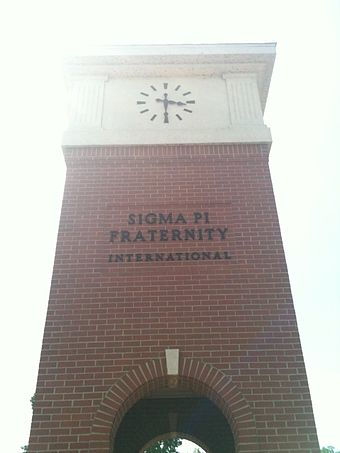Who We Are

A Fraternity is Born
On January 26, 1897, Miss Charlotte N. Malotte, the professor
of Latin and French, spoke to a student group at the chapel hour.
She spoke on the subject of “College Fraternities” which sparked
the interest of several students. Then, on the afternoon of
February 26, a new fraternity had its first meeting. When, after
a long session, the meeting adjourned, a literary society had been
born, though it was yet unnamed. The founders of the Fraternity, all
cadets at Vincennes University, were William Raper Kennedy, James
Thompson Kingsbury, George Martin Patterson, and Rolin Rosco James.
The first three were seniors; James was a freshman.
Samuel and Maurice Bayard were the first initiates.
They were made members of the Fraternity before a name was selected
or a constitution adopted. Many of the first meetings of the
Fraternity were held at the old Bayard home. At the Bayard house,
the constitution was written and the first ritual was developed and
used in the loft of the family’s carriage house.
Our Motto
According to history, the mother of the first two initiates, Mrs. Bayard,
took a deep interest in the organization and used her influence to steer
Tau Phi Delta in the right direction. On one occasion she entered the library
of her home to find a meeting of the Fraternity in progress. The business of
the hour was the adoption of an appropriate motto. No satisfactory agreement
on the subject had been reached. Taking a volume of Elizabeth Barrett Browning’s
poems from a shelf, she turned to A Death In The Desert, and read:
Progress, man’s distinctive mark alone,
Not God’s, and not the beasts’;
God is, they are.
Man partly is and wholly hopes to be.
“That,” Mrs. Bayard said, “would make an excellent motto for your organization.”
With this remark she left the room, and her suggestion had accomplished its purpose. A
motto had been found.

February 11, 1907, is a significant date in the Fraternity’s history. It was then the members last assembled as Tau Phi Delta and first assumed the name of Sigma Pi Fraternity of the United States. Tau Phi Delta had had limited ambitions for expansion. Soon after the name change, Sigma Pi embarked on a program of establishing chapters on other campuses. In 1984, the Fraternity again changed its name. At the 37th Biennial Convocation, Sigma Pi became an international fraternity by accepting its first Canadian chapter. This international status required the Fraternity to become Sigma Pi Fraternity, International.
Today, Sigma Pi is comprised of over 110 active chapters, 12 colonies, and over 77,000 alumni.

